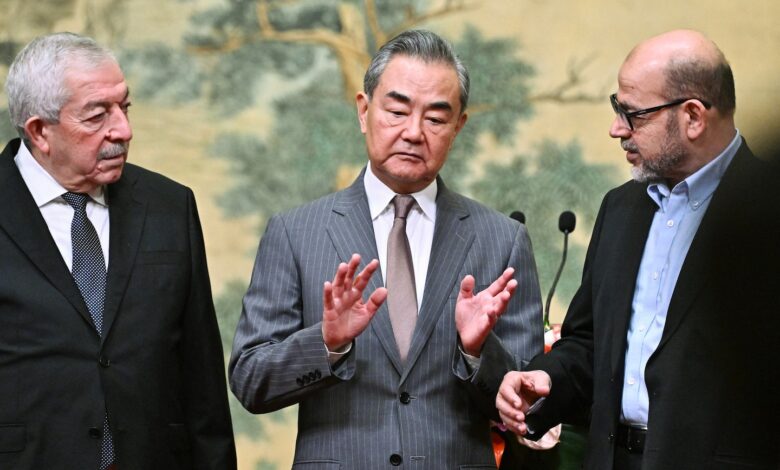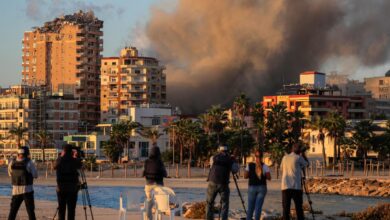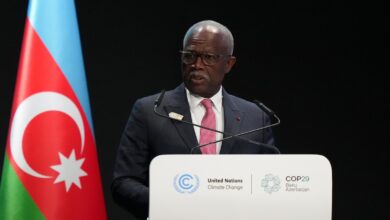China mediates between Hamas, Fatah in ‘Beijing declaration’ on Palestinian unity

Chinese media hailed the “Beijing declaration” as a breakthrough and a sign of the country’s emerging role as a peace broker in faraway conflicts. In a speech after the talks ended, Chinese Foreign Minister Wang Yi called it a “historic moment for the cause of Palestine’s liberation” and highlighted the “consensus around establishing an interim national reconciliation government to manage Gaza after the war.”
Wang restated China’s support for a “comprehensive, lasting and sustainable cease-fire” and for the convening of a large “international peace conference” to work toward a two-state solution.
The joint statement may be a clear diplomatic win for Beijing, but analysts were immediately skeptical about the prospects for this agreement. They noted that it is only the latest in a long series of similar reconciliation deals brokered — then broken — between the two factions since a power struggle that ended in 2007 with Hamas taking control of the Gaza Strip from Fatah officials.
Palestinian political experts generally dismissed the agreement as a rehash of several previous statements of reconciliation, including a 2022 accord signed by 14 Palestinian factions in Algeria. To date, none of those efforts has produced any lasting changes in the Hamas-Fatah rift.
The Chinese initiative comes at a time of peak tensions between the two factions. Palestinian Authority President Mahmoud Abbas recently accused Hamas of prolonging the Gaza war. Hamas leaders in turn accused Abbas of siding with Israel.
GET CAUGHT UP
Stories to keep you informed
Diana Buttu, a Palestinian human rights lawyer and onetime adviser to Abbas, said that the risk now was that the 88-year-old Abbas would sideline the reconciliation efforts as he has done in the past, either under pressure from Israel and the United States to marginalize Hamas or from his own desire to stay in power.
“The reason he hasn’t agreed to this in the past is because he’s afraid he’ll be cast aside,” Buttu said.
Gazans, meanwhile, said the diplomacy was a universe away from the devastation and deprivation of their lives for the last nine months.
“Come here to Earth and look at the hospitals in which there is not a single drop of blood that can save people’s lives,” said Kary Thabit, 40, who has been displaced 10 times in the war and called the factions “a joke.”
“Look at the people in the northern Gaza Strip who are dying of hunger,” she told The Washington Post by phone. “Look at how Israeli tanks are frolicking in the land of Gaza. These people do not represent me. They are just failed actors.”
In Israel, Foreign Minister Israel Katz dismissed the agreement as Palestinian leader Abbas embracing “the murderers and rapists” of Hamas, and predicted that it would come to nothing. “Hamas’s rule will be crushed, and Abbas will be watching Gaza from afar. Israel’s security will remain solely in Israel’s hands,” Katz said.
After decades of preferring to leave contentious diplomacy in the Middle East to the United States, China in recent years has actively cast itself as a viable peacemaker in some of the world’s most intractable hot spots. Beijing brokered a détente last year between Iran and Saudi Arabia, forcing Washington into the awkward position of applauding a major Middle East accord secured by its main geopolitical rival.
“China’s Middle East policy is obviously different from that of the West,” said Tang Zhichao, an analyst at the Chinese Academy of Social Sciences. “There is an urgent need to reverse a lack of mediation by the international community,” brought about in part by the Western world’s geopolitical marginalization of the Palestinian issue, Tang said.
The final statement was peppered with language thanking China for its mediation and the need for more countries to be involved in resolving the Middle East crisis instead of just a “biased” United States.
China has also tried to present itself as a broker in Russia’s war in Ukraine, promoting a 12-point proposal for ending it.
Here’s what else to know:
President Biden will meet with Israeli Prime Minister Benjamin Netanyahu in Washington on Thursday, according to a U.S. official who spoke on the condition of anonymity under ground rules set by the White House. Netanyahu will also meet with Vice President Harris on Thursday, and with former president Donald Trump on Friday, according to the prime minister’s office. He is slated to address a joint meeting of Congress on Wednesday, at 2 p.m. Eastern.
The World Health Organization said Tuesday that there is a high risk of the infectious polio virus spreading in and beyond the Gaza Strip, citing the devastating sanitation conditions there, according to Reuters. WHO and UNICEF teams will arrive in Gaza on Thursday to collect human stool samples, said Ayadil Saparbekov, the team lead for health emergencies at WHO in Gaza and the West Bank, after vaccine-derived polio virus type 2 was detected in sewage samples from Gaza.
Two “clearly marked UNICEF vehicles” were hit with live ammunition while en route to reunite five children with their father, said Adele Khodr, the organization’s regional director for the Middle East and North Africa. No injuries occurred, and the team safely delivered the children, Khodr continued. But the attack was the second targeting of UNICEF cars while on humanitarian duty in the past 12 weeks, she said. “On both occasions, the humanitarian consequences could have been severe, for both our teams and the children they serve,” Khodr said on X.
Israeli schools in the evacuated northern border communities will not open Sept. 1 at the start of the new school year, Israeli Education Minister Yoav Kisch told local authorities Tuesday. Local official Haim Bibas said in a tweet that the government must make “tough decisions” to restore security in the area bordering Lebanon through “force or diplomacy.”
At least 39,090 people have been killed and 90,147 injured in Gaza since the war started, said the Gaza Health Ministry, which does not distinguish between civilians and combatants but says the majority of the dead are women and children. Israel estimates that about 1,200 people were killed in Hamas’s Oct. 7 attack, including more than 300 soldiers, and it says 326 soldiers have been killed since the start of its military operations in Gaza.
Hajar Harb, Hazem Balousha, Suzan Haidamous, Vic Chiang and Kate Brady contributed to this report.






